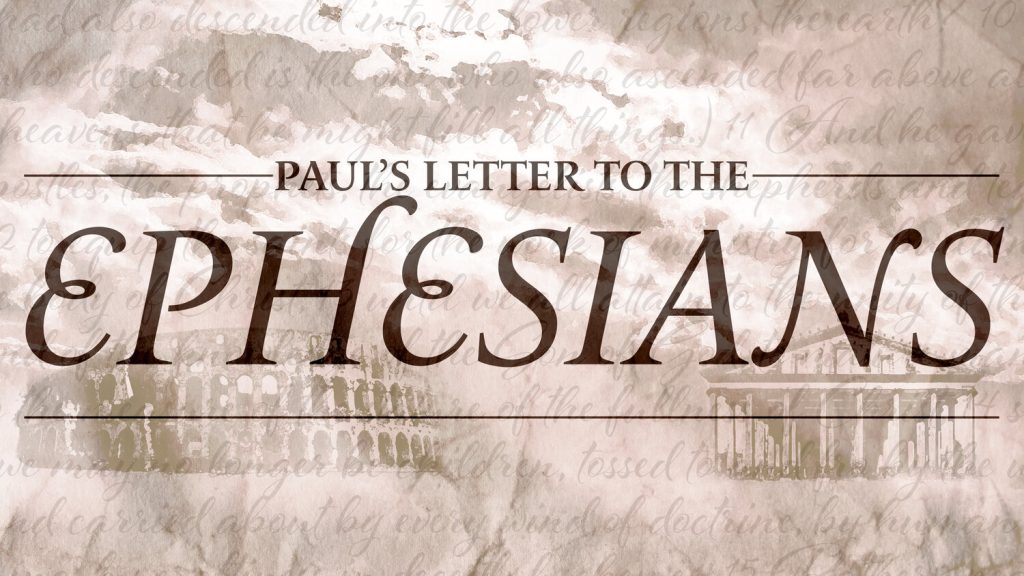Tonight, his week we will be discussing Ephesians 4:1-16. One of the topics tonight is the exercise of spiritual gifts within the Church. If you have time, please read Romans 12:3-8 and 1 Corinthians 12 where Paul has written about this same topic.
Christ’s Gifts: (v.7)
Paul writes that each of us is given grace according to Christ’s measure. v.7. Paul’s idea goes back to the Parable of the Talents and Jesus’s teaching that each of us must exercise those respective spiritual gifts that each of us has been given. See, Matt. 25:15-40. What Paul wants his audience to understand is that these gifts are given to individuals, not for their own personal spiritual benefit, but for the benefit of the church community. Our gifts can only be properly utilized and expressed in service to the body of believers. Otherwise, we are no better than the servant in the parable who received the one talent and buried it in the sand.
The Incarnation: (vv.8-10)
Within this discussion of spiritual gifts, Paul enigmatically quotes Psalm 68:18. Within its historical context, this portion of Psalm 68 recounts the Ark of the Covenant being brought in a triumphal procession up to the Temple in Jerusalem along with any war booty, including slaves, captured in battle. But Paul sees this verse as speaking of the Incarnation, Victory, and Ascension of Christ Jesus thereby giving us a microcosm of the Gospel. See, also, Phil. 2:6-11, John 3:13.
The Psalm says that “he (Christ) ascended on high.” For Christ to have “ascended,” Paul reasons, he must first have “descended.” v.9. This descent is the Incarnation and Christ’s taking on our human nature. In this descent and death and subsequent resurrection, of course, Christ has achieved victory over death and the powers and principalities of this world and has taken them captive. v.8, Eph. 1:22, 1 Cor. 15:57.
Paul writes that Christ ascends “far above all heavens.” The spirits and spiritual forces of wickedness reside in the heavenly places. Eph. 2:2, 6:12. Christ’s Ascension, however, is beyond these heavenly places. v.10. Because of the Ascension and having taken the powers of this world captive, Christ is then able to give the church its spiritual gifts. v.8. For Paul, the gifts that we have and experience are because of Christ’s victory.
Specific Gifts: (v.11-12)
Although all members of the church have received the gift of being saved by grace through the faith of Christ (2:8) and of having a unity in the Spirit under the Father of us all, some in the Church are given specific gifts – apostles, prophets, evangelists, pastors and teachers. See, also, 1 Cor. 12:28. In looking at this list notice how each of these roles involves the proclamation of the Gospel, and the only difference between the roles concerns the size of their respective mission field. The Apostle Paul travels the world, whereas the local congregation is sustained by pastors and teachers.
The specific mission of each of these roles is to equip the saints (the members of the church) for the work of ministry, to build up the body of Christ (this being accomplished through the Gospel proclaimation). These roles are not to impose a church hierarchy or to personally benefit (even spiritually) those who inhabit these roles. Rather, these roles they have the very specific function of equipping each and every member of the church to be able to fulfill their unique and specific function in service to the body of all believers. In 1 Corinthians, Paul talks about this dynamic by writing how he, as the apostle, laid the foundation for the local congregation that the local leadership built upon. 1 Cor. 3:10.
The Goal: (vv. 13-16)
Christ’s gifts and even the ministry of the church do not exist for their own sake. Rather, they have the ultimate purpose of preserving and building up the reconciliation and unity of the Church within itself and with God in Trinity. v.13, Eph. 2:16. This goal is achieved by reaching a spiritual maturity in having the full knowledge of Christ. Spiritual maturity prevents each of us from being carried away by deceitful teaching thereby bringing disunity into the body. v.14. Here (unlike Galatians or elsewhere), Paul is not writing about false doctrine per se, but about false teachings, which in some cases may simply be a wrongful presentation of good doctrine. In working towards this goal of reconciliation and unity, the church will experience growth and the building up of love.
Dinner is a 6. The menu is Kentucky Hot Browns. Discussion about 6:45. Compline around 8. Hope to see you here!
Now there are varieties of gifts but the same Spirit, and there are varieties of services but the same Lord, and there are varieties of activities, but it is the same God who activates all of them in everyone. To each is given the manifestation of the Spirit for the common good I appeal to you therefore, brethren, by the mercies of God, to present your bodies as a living sacrifice, holy and acceptable to God, which is your spiritual worship. Do not be conformed to this world but be transformed by the renewal of your mind, that you may prove what is the will of God, what is good and acceptable and perfect. 1 Corinthians 12:4-7

